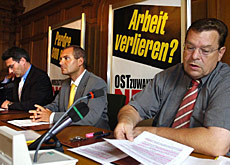Farmers would welcome more migrant workers

Most of the Swiss farming community has voiced its support of the extension of a bilateral labour accord to new member states of the European Union.
Only a few dissidents affiliated to the rightwing People’s Party have called for a “no” vote on September 25, brandishing fears of a foreign “invasion”.
Members of the Swiss Farmers’ Union came showed overwhelming support in favour of the free movement of people accord.
Farm owners have always needed cheap and flexible labour, and migrant workers have traditionally come from Italy, Spain or Portugal.
But a rise in living standards in these countries means there are no longer many Italians, Spanish or Portuguese willing to work for low wages in Switzerland.
Cheap labour now comes from eastern Europe and last year, farming accounted for most of the 2,500 short-term work permits set aside for citizens of the new EU member states.
“We need these workers,” said John Dupraz, vice-president of the Farmer’s Union. “For them, it’s also an opportunity to make some money they can set aside for a project of their own.”
The union says the EU member states must also be treated equally.
“The EU is our main customer and supplier,” added Dupraz. “It’s normal for us to have close ties.”
Dissidents
But not everyone is prepared to hand over the keys to the farm to foreign workers. Recently, a dissident committee recommended a “no” vote.
“The Farmer’s Union is toeing the official line,” said Albert Pitteloud, a farmer from canton Valais. “I don’t think it reflects what farmers really think.”
Pitteloud, a local People’s Party politician, says he isn’t worried about more foreigners coming to Switzerland. He reckons labourers can come from all over the world, as long as there are restrictions on their movement.
What he does fear is more problems for the Swiss social security system.
“All these people will bring their families along and they will end up getting unemployment or disability benefits,” Pitteloud told swissinfo. “It might be cheap labour, but it will end up costing us a lot more.”
Before, he remembers, labourers used to come for a few months each year and then head home. “Now we no longer have seasonal work permits, but we haven’t abolished the seasons,” he adds.
He is not the only member of his party to be nostalgic for the past. Five years ago, People’s Party parliamentarian Jean Fattebert – another farmer – called for the creation of a short-term work permit especially for sectors such as agriculture.
Parliament ignored the request, refusing to turn back the clock. Seasonal work permits were declared incompatible with a first set of bilateral accords concluded with the EU in 1999.
“Short-term work permits mean employees are treated like merchandise and not as human beings,” said Dupraz, who adds that those fighting against the extension of the labour accord are “idiots who cultivate fear of foreigners to attract votes.”
Cheap labour
Another farmers’ association, Uniterre, which lobbies for ecological and economically sustainable agriculture, says it won’t ask its members to vote “yes” or “no” on September 25.
“We don’t tell people how to vote,” says Uniterre secretary Gérard Vuffrey. “What’s important for us is not where labourers come from, but what their working conditions and salaries are.”
Uniterre has been calling for collective bargaining agreement for the farming sector, an idea that has been fought tooth and nail by the Farmers’ Union. The country’s biggest agricultural association has stuck to issuing salary recommendations for each canton.
Without specific training, a farm labourer can expect to earn between SFr3,000 ($2,380) and SFr4,470 per month. With training and 13 years work experience, an agricultural worker can hope for over SFr7,000.
Foreign labourers have to do with much less. Seasonal workers get as little as SFr2,675 a month during their first year on the job, and these figures include room and board.
Do with less
These numbers, given out by the Farmers’ Union don’t tell the whole story. Some labourers have to do with even less, especially if they are illegal employees.
Nobody really wants to talk about this problem though. “Of course there are employers who cheat,” admits Dupraz, “but I suggest you take a look at other sectors, such as domestic help.”
L’Autre Syndicat (the Other Union), an organisation that is trying to bring together illegal farm workers, puts the number of clandestine labourers at around 8,000.
It has also called for a collective bargaining agreement, but has given its support to a “yes” vote in September as well.
Its leader, Philippe Sauvin, says there is no foreign invasion to fear and that free movement of labour will guarantee decent salaries and working conditions that today’s illegal workers can only dream about.
swissinfo, Marc-André Miserez
If the Swiss vote “yes” on September 25, workers from the ten new EU member states will only enter the labour market progressively.
Work permits for citizens of the eastern EU states will be otherwise limited until 2011, and possibly 2014 if necessary.
Employers will have to prove they could not find a similarly qualified Swiss for the job.
The cantons will have to ensure the salaries and working conditions of EU employees adapted to Swiss conditions.
According to the Swiss Farmers’ Union, 112,000 Swiss worked on private farms in 2000.
Last year, these farms had 12,000 foreign employees, most of whom were on short-term work permits.
Around 80 per cent came from the original 15 EU members and the rest from countries granted access to the Swiss labour market.
Some estimates put the number of illegal farm workers at 8,000.

In compliance with the JTI standards
More: SWI swissinfo.ch certified by the Journalism Trust Initiative











You can find an overview of ongoing debates with our journalists here . Please join us!
If you want to start a conversation about a topic raised in this article or want to report factual errors, email us at english@swissinfo.ch.